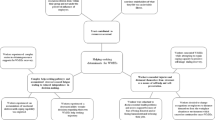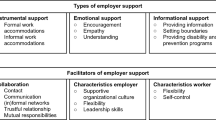Abstract
Drawing upon in-depth interviews with forty-one respondents, the present study explores how different types of pre-entry relationships influence post-entry help-seeking of people with disabilities during the socialization period. Findings indicate that help-seeking is influenced by pre-entry relationships that persist post organizational entry and by coworkers who can trigger a self-perpetuating cycle of relational acceptance by the broader group of colleagues. Findings imply that pre-entry relationships with coworkers can offer newcomers relational benefits that are similar to those afforded to longer tenured employees. The study raises questions about optimal balance in workplace relationships and about social boundaries created by fairness considerations.
Similar content being viewed by others
References
Allen, T. D., McManus, S. E., & Russell, J. E. A. (1999). Newcomer socialization and stress: Formal peer relationships as a source of support. Journal of Vocational Behavior, 54, 453–470.
Alvesson, M., Hardy, C., & Harley, B. (2008). Reflecting on reflexivity: Reflexive textual practices in organization and management theory. Journal of Management Studies, 45, 480–501.
Amato, P. R., & Saunders, J. (1985). The perceived dimensions of help-seeking episodes. Social Psychology Quarterly, 48, 130–138.
Austin, J. R. (2003). Expertise and friendship: Help seeking efficacy in groups. Academy of Management Best Conference Paper, OB: H1-H6.
Baldridge, D. C., & Veiga, J. F. (2001). Toward a greater understanding of the willingness to request an accommodation: Can requesters’ beliefs disable the Americans with disabilities act? Academy of Management Review, 26, 85–99.
Baldridge, D. C., & Veiga, J. F. (2006). The impact of anticipated social consequences on recurring disability accommodation requests. Journal of Management, 32, 158–179.
Bamberger, P. (2009). Employee Help seeking antecedents, consequences and new insights for future research. Research in Personnel and Human Resources Management, 28, 49–98.
Blau, P. M. (1964). Exchange and power in social life. New York: Wiley.
Borgatti, S. P., & Cross, R. (2003). A relational view of information seeking and learning in social networks. Management Science, 49, 432–445.
Boyle, M. A. (1997). Social barriers to successful reentry into mainstream organizational culture: Perceptions of people with disabilities. Human Resource Development Quarterly, 8, 259–268.
Carr, J. C., Pearson, A. W., Vest, M. J., & Boyar, S. L. (2006). Prior occupational experience, anticipatory socialization, and employee retention. Journal of Management, 32, 343–359.
Chao, G. T., O’Leary-Kelly, A. M., Wolf, S., Klein, H. J., & Gardner, P. D. (1994). Organizational socialization: Its content and consequences. The Journal of Applied Psychology, 79, 730–743.
Cleavenger, D., Gardner, W. L., & Mhatre, K. (2007). Help-seeking: Testing the effects of task interdependence and normativeness on employees propensity to seek help. Journal of Business and Psychology, 21, 331–359.
Colella, A. (1994). Organizational socialization of employees with disabilities: Critical issues and implications for workplace interventions. Journal of Occupational Rehabilitation, 4, 87–106.
Colella, A. (2001). Coworker distributive fairness judgments of the workplace accommodation of employees with disabilities. Academy Of Management Review, 26, 100–116.
Colella, A., Paetzold, R. L., Belliveau, M. A., & Hollenbeck, J. (2004). Factors affecting coworkers’ procedural justice inferences of the workplace accommodations of employees with disabilities. Personnel Psychology, 57, 1–23.
Confederation of Indian Industry. (2009). A values route to business success: The why and how of employing persons with disability. Bangalore: Diversity and Equal Opportunity Center.
DePaulo, B. (1982). Social psychological processes in informal help-seeking. In T. A. Wills (Ed.), Basic processes in helping relationships (pp. 255–279). New York: Academic.
Feldman, D. (1976). A contingency theory of socialization. Administrative Science Quarterly, 21, 433–444.
Feldman, D. (1981). The multiple socialization of organization members. Academy of Management Review, 6, 309–318.
Gilligan, C. (1982). In a different voice: Psychological theory and women’s development. Cambridge: Harvard University Press.
Goffman, E. (1963). Stigma: Notes on the management of spoiled identity. Englewood Cliffs: Prentice Hall.
Gross, A. E., & McMullen, P. A. (1982). The help-seeking process. In V. J. Derlega & J. L. Grzelak (Eds.), Cooperation and helping behavior: Theories and research (pp. 305–326). New York: Academic.
Gruman, J. A., Saks, A. M., & Zweig, D. I. (2006). Organizational socialization tactics and newcomer proactive behaviors: An integrative study. Journal of Vocational Behavior, 69, 90–104.
Hannah, D. R., & Lautsch, B. A. (2011). Counting in qualitative research: Why to conduct it, when to avoid it, and when to closet it. Journal of Management Inquiry, 20, 14–22.
Hofmann, D. A., Lei, Z., & Grant, A. M. (2009). Seeking help in the shadow of doubt: The sensemaking processes underlying how nurses decide whom to ask for advice. The Journal of Applied Psychology, 94, 1261–1274.
Jokisaari, M., & Nurmi, J. (2009). Change in newcomers’ manager support and socialization outcomes after organizational entry. Academy of Management Journal, 52, 527–544.
Jones, G. E. (1997). Advancement opportunity issues for people with disabilities. Human Resource Management Review, 7, 55–76.
Kammeyer-Mueller, J. D., & Wanberg, C. R. (2003). Unwrapping the organizational entry process: Disentangling multiple antecedents and their pathways to adjustment. The Journal of Applied Psychology, 88, 779–794.
Klein, H. J., & Heuser, A. E. (2008). The learning of socialization content: A Framework for researching orientating practices. Research in Personnel and Human Resources Management, 27, 279–336.
Klimoski, R., & Donahue, L. (1997). HR strategies for integrating individuals with disabilities in the work place. Human Resource Management Review, 7, 109–138.
Kulkarni, M., & Lengnick-Hall, M. (2011). Socialization of people with disabilities in the workplace. Human Resource Management, 50, 521–540.
Lee, F. (1997). When the going gets tough, do the tough ask for help? Help seeking and power motivation in organizations. Organizational Behavior and Human Decision Processes, 72, 336–363.
Lee, F. (2002). The social costs of seeking help. The Journal of Applied Behavioral Science, 38, 17–38.
Lengnick-Hall, M. L., Gaunt, P. M., & Kulkarni, M. (2008). Overlooked and underutilized: People with disabilities are an untapped human resource. Human Resource Management, 47, 255–273.
Lin, N. (1999). Building a network theory of social capital. Connections, 22, 28–51.
Maurer, T. J., Pierce, H. R., & Shore, L. M. (2002). Perceived beneficiary of employee development activity: A three-dimensional social exchange model. Academy of Management Review, 27, 432–444.
Miles, M. B., & Huberman, A. M. (1994). Qualitative data analysis. Thousand Oaks: Sage.
Morrison, E. W. (2002). Newcomers’ relationships: The role of social network ties during socialization. Academy of Management Journal, 45, 1149–1160.
Nadler, A., Ellis, S., & Bar, I. (2003). To seek or not to seek: The relationship between help-seeking and job performance evaluations as moderated by task-relevant expertise. Journal of Applied Social Psychology, 33, 91–109.
Reichers, A. E. (1987). An interactionist perspective on newcomer socialization rates. Academy of Management Review, 12, 278–287.
Riordan, C. M., Weatherly, E. W., Vandenberg, R. J., & Self, R. M. (2001). The effects of pre entry experiences and socialization tactics on newcomer attitudes and turnover. Journal of Managerial Issues, 13, 159–176.
Rynes, S. L., Bretz, R. D., Jr., & Gerhart, B. (1991). The importance of recruitment in job choice: A different way of looking. Personnel Psychology, 44, 487–521.
Scholarios, D., Lockyer, C., & Johnson, H. (2003). Anticipatory socialisation: The effect of recruitment and selection experiences on career expectations. Career Development International, 8, 182–197.
Settoon, R. P., & Adkins, C. L. (1997). Newcomer socialization: The role of supervisors, coworkers, friends and family members. Journal of Business and Psychology, 11, 507–516.
Snyder, L. A., Carmichael, J. S., Blackwell, L. V., Cleveland, J. N., & Thornton, G. C. (2010). Perceptions of discrimination and justice among employees with disabilities. Employee Responsibilities and Rights Journal, 22, 5–19.
Stone, D., & Colella, A. (1996). A model of factors affecting the treatment of disabled individuals in organizations. Academy of Management Review, 21, 352–401.
Strauss, A., & Corbin, J. (1990). Basics of qualitative research. Thousand Oaks: Sage.
Wills, T. A. (1983). Social comparison in coping and help seeking. In B. M. DePaulo, A. Nadler, & J. D. Fisher (Eds.), New directions in helping, vol. 2 (pp. 109–142). New York: Academic.
World Health Organization. (2011). World report on disability. Geneva: WHO Press.
Author information
Authors and Affiliations
Corresponding author
Rights and permissions
About this article
Cite this article
Kulkarni, M. Help-Seeking Behaviors of People with Disabilities in the Workplace. Employ Respons Rights J 25, 41–57 (2013). https://doi.org/10.1007/s10672-012-9202-x
Published:
Issue Date:
DOI: https://doi.org/10.1007/s10672-012-9202-x




